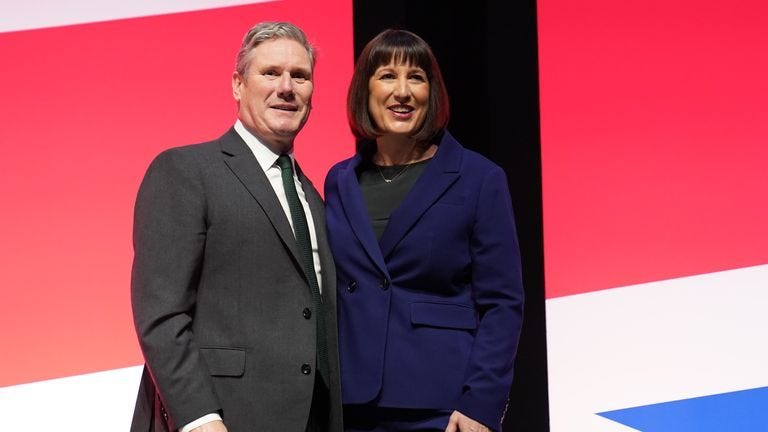We need to have a serious talk about the Labour Party and how they are committing electoral suicide.
I’ve had my grievances with the Labour Party in the past. The party's lack of direction and trust that they would be able to form some kind of cohesive government, with or without a coalition, was one of the main reasons I left the pressure group Compass. I believed that Labour (and the Liberal Democrats, too, to be fair) did not think that a progressive government was better than a Conservative one; instead, they believed that their being in government was the only acceptable option, even if it meant they would sell their soul (fundamental beliefs and membership base) to achieve that. After that, I joined the Green Party and have been relatively happy with their efforts to prepare for the next election. So, you could say that, in some ways, I saw the iceberg coming.
But what exactly am I referring to?
I’m talking about Labour's persistent desire to U-turn on issues. To abandon who they are on this drive towards trying to win. By losing their identity, they are sacrificing chances of victory and, arguably more importantly, opportunities for longevity if they come to power.
I was going to make this entire post about Labour's decision to roll back on the pledge to provide £28 billion a year to fund the UK green investment programme promised last year, but when you begin to dig down into it, why stop there? When there's so much more that can be unearthed.
This path all started with Starmer's pitch for leadership in 2020. He was seen as the most likely to succeed Jeremy Corbyn after the beating that was handed to Labour in the 2019 election, and to achieve this, he hit all the right notes with promises to the predominantly more left-wing Labour Party membership. Since then, it has become clear to the base that had swelled under Corbyn that Starmer was only using them as a means to an end and that all his pledges have been smoke and mirrors used to manoeuvre his way into power.
We can point to pledges such as proposed moves towards Labour supporting proportional representation. This idea has increasingly gained traction with progressive voters who feared it was becoming increasingly unlikely they could win an election again due to strong Conservative results. Or the proposed scrapping of tuition fees, which, truthfully, people on the left should have known better than to trust with the track record of the coalition government. We could look at the proposed reforms to universal credit, which have been dumped, alongside any consultation on policy to universal basic income. But don’t worry; limitations on people's welfare are being kept, with the two-child benefit cap still in place, even though approximately 1.5 million children have been negatively impacted, and a quarter of a million of them would be lifted out of poverty overnight if the cap was removed.
I could go on.
When I first started writing this piece last week, the issue I wanted to focus on was the most recent Labour backtrack, the decision to ditch the £28 billion a year policy for their green prosperity plan. While the number was officially dumped last year, the party's top brass have been trying to take it out of the conversation for months. First, it was meant to be over the curse of the first term of a Labour government, then it was meant to be £28 billion starting in 2027, and then it was dumped ultimately. This isn’t, as Labour suggest, because the economic situation is different from when the plan was made; this is because environmental politics weren’t shown to be sexy when put to a small subsection of the country in the Uxbridge by-election last year. Thirteen thousand nine hundred sixty-five people (the number who voted Conservative in that contest) in an outer London suburb were unknowingly dictating the decision-making of a supposedly sentient leadership team of a government to be.
One of Michelle Obama’s most famous lines is “When they go low, we go high.” But clearly, nobody in the Labour camp has ever spoken to or heard of the Obama family. When your political opponents take a direction, you don’t just choose to mirror that because that’s what you think will allow you to win; you show a bit of a backbone and stick to what you believe in, especially since that’s the line they have taken for the entirety of Starmers time in power. I’ve already attacked the Conservatives for being too soft on environmental policy. I’ll do the same to Labour because, in ten years, the conversation will likely be very different when the world has moved in the wrong direction because of horrendous decision-making in the present.
I’ve also already attacked the Labour Party over their indecisiveness on the Gaza conflict. Since I wrote that piece, a lot of what I predicted has come to pass; two MPs have been suspended from the party over their comments which have been supportive of Palestine, alongside tens, if not hundreds of councillors who have either been suspended, chose to defect parties, sit as independents or quit politics all together over the issue. Most recently, we’ve seen the whole fiasco with the deselection of the candidate for the Rochdale by-election, something I’ll talk about later when I inevitably choose to analyse it in a separate post. Starmer, like other Western leaders, still dithers on the issue. Journalists are now once again beginning to bring back the rhetoric that Labour still has a problem with anti-Semitism while, at the same time, Labour is alienating a lot of its Muslim supporter base that it takes for granted and has done so for years.
I think Labour seems weak, unsure of themselves, their position, and their leadership while struggling to combat the rise of the hardline Conservatives and the Far right in Reform UK, who have the potential to take millions of votes and are currently polling as Britain's third most popular party above the Lib Dems and Greens.
They’re trying to be the same as the Conservatives but without the baggage of the last fourteen years of government. However, it’s becoming increasingly clear that this will not work and is not what many people want. They want real change that will make them feel as though they are better off rather than enormous sums of money being promised here and there only for them not to materialise later. If people had wanted that, they would have continued voting Conservative and wouldn’t feel the need to go to the hard right.
It’s been proven that austerity was a lie and that the country's economy cannot be managed like a household. Ten years of spending cuts to vital services and communities were just a ploy to push through the fetishes of the elite. Once they needed to change their fortunes around, the government could take a sledgehammer to the piggy bank to spend the most money nationwide since the Second World War. Now that Labour wants to be seen as “sensible” with the economy, they think it’s alright to put the plug back in spending.
The thing is that this time, people have seen this before, and they know it's a con designed to keep them in their societal positions while those at the top benefit from others' misery. Labour coming into power with the plans they have at the moment means a slight alteration of which of those people can benefit from that layer of prosperity. Keir Starmer and Rachael Reeves would be chief among them. We might get a better idea when a full manifesto is launched in the contest run-up, but based on the evidence from the Starmer Tenure, that doesn’t appear likely.
Many people in both government and opposition are acting like the race has already been won, and Labour will come into power within the next twelve months; I wouldn’t be so sure. If there's one thing politicians from the progressive side of the political spectrum know how to do, it's to count victories before they’ve won them. Many Conservative voters may choose not to vote Conservative this time round, but this is being confused with meaning that those votes immediately translate to additions for Labour; they don’t. Nobody I’ve talked to on this issue is keen on Starmer or Reeves being anywhere near power.
I’m coming round to the dangerous thought pattern that I would be happy if Labour committed electoral suicide and lost the next election. Even if that happiness only lasted a few minutes before I figured out its consequences. It’d teach Labour a lesson and potentially lead to something meaningful coming out of the majority of the Left in Britain.
Why Republicans (and some Democrats) are abandoning Ukraine
You might have realised by now that I'm not a big fan of international relations (IR). Not that it isn’t vital. Quite the opposite, it has far more significant consequences than anything I choose to focus on. I took three IR and IR theory modules throughout my politics and history uni degree. Partly, it bored me, but mainly, I wasn't very good at it, so…
I'm getting slightly sick of by-elections
I’ve started a tradition of writing something about every UK by-election. I thought it would be a nice idea. Except we’ve had six since I began writing this blog when the usual proceedings mean only one happens every blue moon. Now we’re getting three more, and I want to talk about two of them today, both due to occur on the 15th of February.




